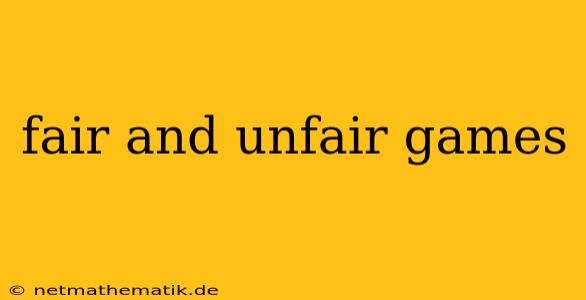The concept of fairness is deeply ingrained in our understanding of games. We instinctively gravitate towards games that feel equitable, where skill and strategy hold sway, and chance plays a minimal role. However, the world of games, from simple board games to complex video games, spans a vast spectrum of fairness. Some games are designed with a clear focus on creating a level playing field, while others embrace randomness and unpredictability as core elements of their design. This exploration delves into the fascinating dichotomy of fair and unfair games, exploring the factors that contribute to a game's perceived fairness and the impact these choices have on player experience and enjoyment.
The Foundation of Fairness in Games
The essence of a fair game lies in the balanced interplay of chance and skill. A fair game allows players of varying skill levels to compete on an equal footing, with the outcome determined primarily by their strategic choices and execution. This balance ensures that players are rewarded for their efforts and that victories feel earned, not merely the result of luck. Here are key elements that contribute to a game's perceived fairness:
Transparent Rules and Mechanics:
The foundation of fairness rests upon clear, consistent, and easily understandable rules. Players should be able to grasp the game's mechanics, understand how actions impact outcomes, and anticipate the consequences of their choices. Games with obscure or poorly explained rules create an uneven playing field, fostering frustration and undermining the sense of fair competition.
Balanced Game Mechanics:
Fairness also hinges on the balanced design of game mechanics. This means that the strengths and weaknesses of different characters, strategies, or items are carefully considered and calibrated to prevent any single element from dominating the game. A well-balanced game allows players to explore diverse approaches, encouraging experimentation and strategic decision-making.
Randomness and its Role:
While randomness is a common element in many games, it should be introduced judiciously. Fair games often use randomness as a tool for injecting unpredictability and encouraging strategic adaptation, but it shouldn't be the sole determinant of the outcome. Excessive reliance on randomness can create a sense of arbitrariness, diminishing the significance of player skill and leading to frustration when outcomes feel beyond their control.
The Appeal of Unfair Games
While fairness is often considered a cornerstone of enjoyable gameplay, there's a distinct appeal to unfair games, particularly those that embrace randomness and unpredictable elements. These games, often categorized as "roguelikes" or "permadeath" games, present a unique challenge that can be immensely satisfying. Here's what makes unfair games so captivating:
The Embrace of the Unknown:
Unfair games often prioritize unpredictability, offering a constantly evolving landscape with unexpected encounters and challenges. This element of surprise keeps players engaged and on their toes, as they navigate through a world that's constantly shifting around them.
The Thrill of Risk and Reward:
The high-stakes nature of unfair games elevates the significance of each decision. The possibility of permanent loss or failure adds an element of risk that makes victories all the more rewarding. These games thrive on the adrenaline rush of pushing boundaries and defying the odds.
The Cycle of Failure and Learning:
Unfair games often necessitate a learning curve, where players must adapt and improve through repeated failures. Each loss provides valuable insights, shaping strategies and informing future decisions. This iterative process of learning and overcoming challenges can be highly satisfying, fostering a sense of mastery and accomplishment.
Examples of Fair and Unfair Games
To illustrate the distinction between fair and unfair games, let's examine some examples:
Chess:
Chess is a classic example of a fair game where skill and strategy reign supreme. Each player begins with the same pieces and moves, the rules are well-defined, and the outcome is solely determined by the players' choices.
Poker:
Poker, while often perceived as a game of skill, incorporates elements of chance through the use of cards. However, even with the element of randomness, the game is considered relatively fair due to its transparent rules and reliance on player strategy and decision-making.
The Binding of Isaac:
The Binding of Isaac is a prime example of an unfair game. It features randomly generated levels, a vast array of items with unpredictable effects, and a high degree of difficulty. The game embraces its "unfairness" as a core design principle, challenging players to adapt and overcome seemingly insurmountable odds.
The Importance of Choice
Ultimately, the question of whether a game is fair or unfair is subjective and depends on the individual player's preferences. Some players thrive on the predictability and balance of fair games, finding satisfaction in the strategic mastery they gain through practice and skill. Others are drawn to the chaos and unpredictable nature of unfair games, relishing the thrill of risk and the sense of accomplishment they experience when overcoming seemingly impossible challenges. The beauty of games lies in their diversity, offering a wide range of experiences to cater to different player preferences. The key is to choose games that align with your individual values and expectations, ensuring a satisfying and engaging experience.
Conclusion
The dichotomy of fair and unfair games reflects a fundamental tension within the realm of gaming. While fairness provides a solid foundation for balanced competition and a sense of achievement, the unpredictable nature of unfair games can offer a unique thrill and foster a sense of mastery through perseverance and adaptation. The most enjoyable games are those that strike a balance between these two elements, offering a blend of challenge, unpredictability, and a sense of accomplishment that leaves players wanting more. Regardless of whether you're drawn to the strategic depth of a fair game or the exhilarating chaos of an unfair one, the world of gaming offers something for everyone.
